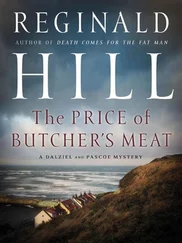Hadda was different. Though he had by now served enough time to be eligible for parole he had made no application nor shown the slightest interest in doing so.
Not of course that there was much point. A conviction like his made it very hard to persuade the parole board to release you back into the community, particularly when your application was unsupported by any admission of guilt or acceptance of treatment.
But at least he had started writing these narratives. That had to be progress.
And there was something about him today, something only detectable once he’d started talking. An undercurrent of restlessness; or, if that was too strong, at least a sense of strain in his self-control.
She said, ‘Wilfred…Wilf…’
Both versions of his name felt awkward on her lips, smacking of the enforced familiarity of the hospital ward or the nursing home. His expression suggested he was enjoying her problem.
She said, ‘…Wolf.’
He nodded as if she’d done well and said, ‘Yes, Elf?’
Her sobriquet came off his tongue easily, almost eagerly, as though she were an old friend whose words he was anxious to hear.
She said, ‘How do you feel about Imogen now?’
He frowned as if this wasn’t the question he’d been looking for.
‘About the fact that she divorced me? Or the fact that she subsequently married my former solicitor and friend, Toby Estover? Wonder how that worked out?’
He spoke casually, almost mockingly. A front, she guessed. And she also guessed he might have a pretty good idea how it had worked out. Modern prisons had come a long way from the Bastille and the Chateau d’If, where a man could linger, forgotten and forgetting, oblivious to the march of history outside. She’d checked on the happy pair, telling herself she had a professional interest. Estover was now, if not a household name, at least a name recognized in many households. He was so sought after he could pick and choose his clients, and the fact that he seemed to pick those involved in cases that attracted maximum publicity could hardly be held against him.
As for the lovely Imogen, she was certainly as lovely as ever. Alva had seen a recent photo of her in the Cumbrian churchyard where her daughter’s ashes were being placed in the family tomb. Not an event that drew the world’s press, but a local reporter had been there and taken a snap on his mobile. By chance he’d got a combination of light, angle, and background that lent the picture a kind of dark, brooding Brontë-esque quality, and the Observer had printed it for its atmospheric impact rather than its news value.
She said, ‘I just wondered what you feel when I mention her name?’
‘Hate,’ he said.
This took her aback.
He said, ‘You look surprised. That I should feel it, or that I should say it?’
‘Both. It’s such an absolute concept…’
‘It’s not a bloody concept!’ he interrupted. ‘It has nothing to do with intellectual organization. You asked what I felt. What else should I reply? Contempt? Revulsion? Anger? Dismay? A bit of all of those, I suppose. But hate does it, I think. Hate folds them all neatly into a single package.’
‘But what has she done to deserve this?’ she asked.
‘She has believed the lies they told about me,’ he said. ‘And because she believed them, my lovely daughter is dead.’
All Alva’s previous attempts to get him to talk about his daughter had been met with his mountainous blankness, but now for a moment she saw the agony that seethed beneath the rocky surface.
She said in her most neutral tone, ‘You blame her for Ginny’s death?’
He was back in control but within his apparent calm she sensed a tension like that intense stillness of air when an electric storm is close to breaking.
‘Maybe,’ he said. ‘But not so much as I blame her bitch of a mother.’
She noted that, despite the intensity of the negative feelings he’d expressed about Imogen, he was reluctant to lay full responsibility for the girl’s death upon her. Whatever bonds there had been between him and his wife must have been unusually strong for this ambiguity of feeling to have survived.
‘You hold Lady Kira responsible?’
‘Oh yes. Everything tracks back to her. She never wanted me to have her daughter. And now she has helped deprive me of mine.’
‘And she did this, how? By helping with the arrangements for her to finish her education in France, out of reach of our prurient press?’
She deliberately let a trace of doubt seep into her voice, hoping to provoke further revelation of what was going on inside his mind, but all she succeeded in doing was bring down the defences even further.
He said indifferently, ‘If you’d ever met her, you’d understand.’
This for the moment was a dead end. Leave the mother-in-law, get back to the wife, she told herself.
She said, ‘If, as you claim, you are innocent, then someone must have framed you. Do you have any idea who?’
The question seemed to amuse him.
‘I have a short list of possibilities, yes.’
‘Is Imogen on it?’
The question seemed to surprise him. Or perhaps he simply didn’t like it. She really must find a way to get into this key relationship.
‘What does it matter?’ he demanded. ‘Which is worse? That she went along with a plot to frame me? Or that she actually believed I was guilty as charged?’
‘Be fair,’ said Alva. ‘The evidence was overwhelming; the jury took twenty minutes to find you guilty…’
‘Twelve strangers!’ he interrupted. ‘Twelve citizens picked off the street! In this world we’re unfortunate enough to live in, and especially in this septic isle we live on, where squalid politicians conspire with a squalid press to feed a half-educated and wholly complacent public on a diet of meretricious trivia, I’m sure it would be possible to concoct enough evidence to persuade twelve strangers that Nelson Mandela was a cannibal.’
Wow! she thought as she studied him closely. That rolled off your tongue so easily, it’s clearly been picking up momentum in your mind for years!
His voice was still controlled, but his single eye sparkled with passion. What was it he said he felt about his ex-wife’s behaviour?
Contempt.
Revulsion.
Anger.
Dismay.
These were all necessary elements of that condition of self-awareness she was trying to draw him to. Perhaps by transferring these emotions away from himself to his ex-wife, he was showing her he was closer than she’d thought. His strained parallel with Mandela was also significant. A man of dignity and probity, imprisoned by a warped regime, and finally released and vindicated after long years to become a symbol of peace and reconciliation. It was as if Hadda’s denial could only be sustained by going to the furthermost extreme in search of supportive self-images.
Hopefully, if he continued far enough in that direction, he would eventually come upon himself unawares. And then it would be up to her to direct him away from self-hatred into more positively remedial channels.
Meanwhile it would be good if she could nudge him into a memory of Imogen in her fairy-tale princess phase. It was possible that by reliving that period when she had become the unique and obsessive object of his adoration, he might come to wonder whether it was in fact his idol that had fallen or himself.
Even if that admittedly ideal outcome didn’t materialize, this was the part of his life she had least information about, for there were few living sources but himself.
Now the passion had faded and he was looking at her assessingly.
He’s got something else for me, she thought. She knew how habit-forming this business of writing about your past could be. In many clients, it went beyond habit into compulsion. So of course since their last meeting he’d carried on writing.
Читать дальше












